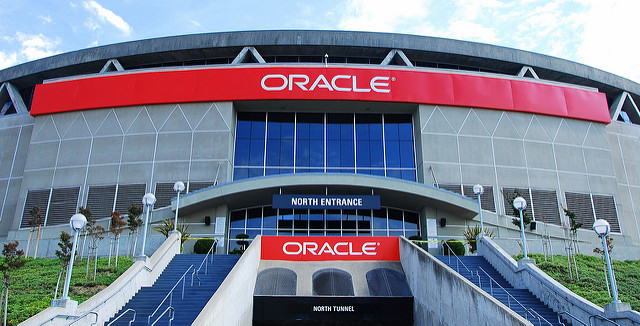Oracle Shifting Gears To Hold Amazon RedShift In Its Tracks

Photo Credit: May Wong/Flickr.com
Oracle (NYSE: ORCL) recently reported its first quarter results that sent its stock tumbling. Its disappointing earnings forecast caused its stock to fall 8% in a day, making it the worst performing stock on the S&P index in the day, and also marking it as the worst day the stock had in the past four years.
Oracle’s Financials
The quarter’s results weren’t all that bad though. Revenues for the quarter came in at $9.2 billion, ahead of the Street’s forecast of $9.02 billion. Non-GAAP earnings of $0.62 per share was also ahead of the analyst estimate of $0.61 per share for the quarter.
By segment, revenues from the total cloud business segment grew 16% to $1.47 billion. Traditional software licensing revenues grew 65% to $5.92 billion. Hardware revenues climbed 10% to $943 million and services revenues improved 9% to $860 million.
The stock soared to a high after the positive results. But it was short lived as the outlook was rather disappointing. Oracle forecast an adjusted profit of $0.64-$0.68 a share in the current quarter, and a revenue growth of 2%-4%, or $9.25-$9.42 billion on a constant currency basis. The market was looking for adjusted earnings of $0.68 per share with revenue growth of 4.7% or revenues of $9.56 billion. The market was even concerned about Oracle’s cloud revenues. The current forecast implied cloud revenue growth of $1.53-$1.58 billion, falling short of analyst estimate of $1.61 billion.
Oracle Competing with Amazon
Meanwhile, Oracle continues to invest in cloud products and services. Its latest product release, slated for debut during the OpenWorld in a few weeks, will compete strongly with Amazon. Oracle is building a next generation of the Oracle Database that will be unveiled in the conference for delivery by the end of this calendar year. The new database will make it the world’s first fully autonomous database. It has been based on machine learning and is a totally automated self-driving system. It does not require any human interaction for its management and will be able to automatically tune, patch, and upgrade itself while the system is running.
Oracle has integrated artificial intelligence in the system to eliminate human error and to deliver unprecedented reliability in the cloud. It will be able to offer 99.995% systems availability time – that translates to less than 30 minutes of planned or unplanned downtime per year. Oracle believes that this level of reliability will help it compete with the likes of Amazon’s RedShift. Oracle also believes that the new database will be able to cut customers’ costs by half when compared to operating them on RedShift.
According to recent market reports, Amazon Web Services dominates the public cloud market with a 47.1% market share. Microsoft Azure is gradually increasing its share, but it is still a distant second with 10% of the market. But it is Amazon’s RedShift that is causing a stir in Oracle’s world. In July this year, AWS claimed that 35,000 businesses had moved their databases to Amazon Redshift.
RedShift is a data warehousing offering that is based on a technology called ParAccel that slices databases into more focused repositories of records, for doing analysis on data. Prior to Amazon entering the market, the top five vendors in the data warehousing software market were Oracle, Microsoft, IBM, Teradata, and SAP, accounting for 90% of the market. Amazon has been eating rapidly into this market. According to IDC estimates, in 2015, Amazon delivered 237% growth – the highest of any vendor in the Analytic Data Management Software market. During the same period, the total market grew 2.7% over the year to $9.9 billion. Analysts estimate that RedShift will become a $500 million offering by 2019.
Oracle should be able to compete with Amazon RedShift because databases and data warehousing are in its core expertise area. The current drop in their stock price may just be a good buying opportunity for the market.
Oracle’s stock is currently trading at $48.74 with a market cap of $201.6 billion. It touched a 52-week high of $53.14 earlier this month. It had fallen to a 52-week low of $37.62 in October last year.
Sramana Mitra is the founder of One Million by One Million (1M/1M), a global virtual incubator that aims to help one million entrepreneurs ...
more


